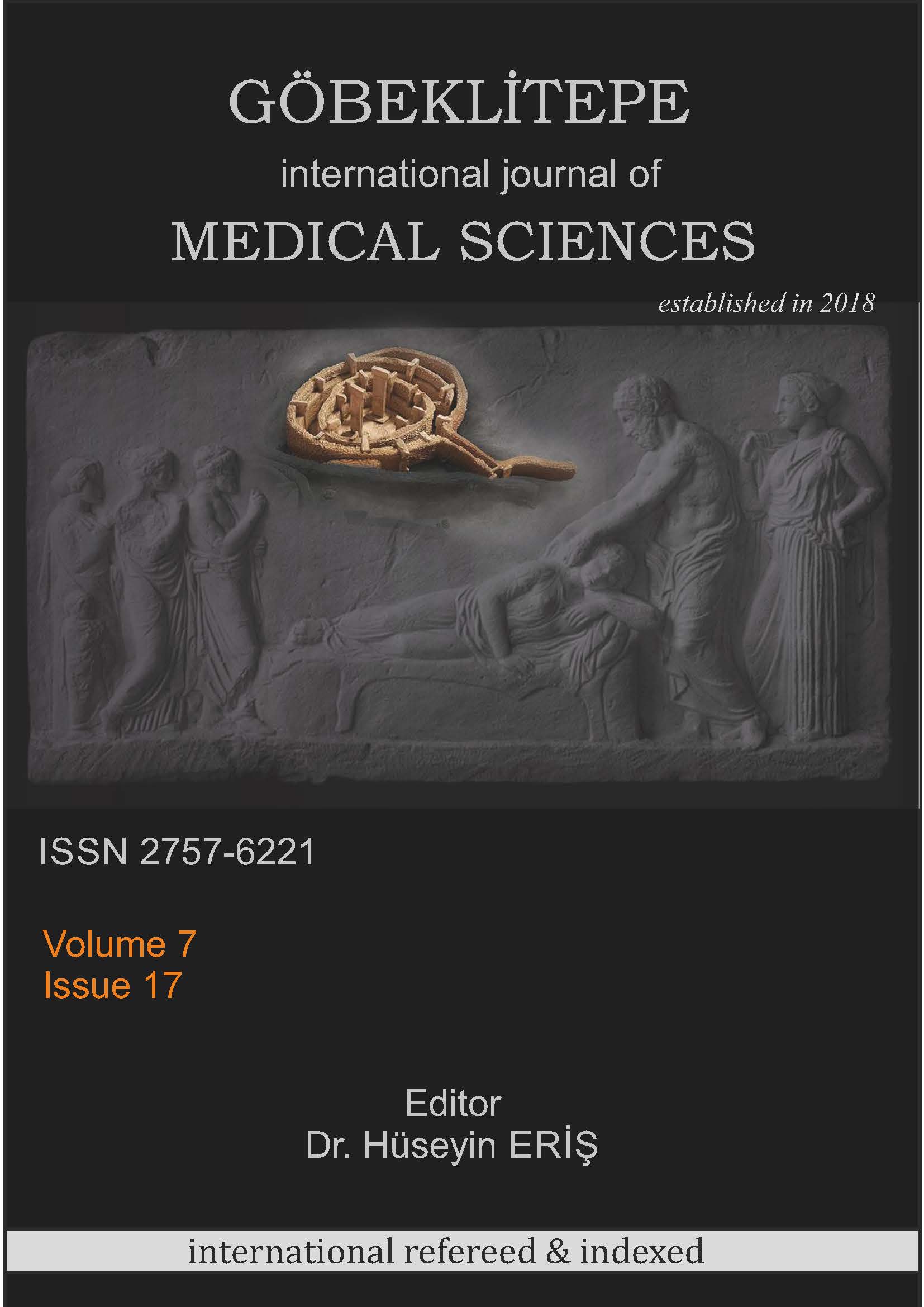İngilizce FACING POSTTRAUMATIC STRESS DISORDER AND SUFFERING IN NURSING STUDENTS AFTER THE EARTHQUAKE
Keywords:
Earthquake, Nursing Student, Suffering, osttraumatic Stress DisorderAbstract
This study investigates the psychological and emotional consequences of an earthquake on nursing students. This study utilized a mixed research design consisting of qualitative in-depth interviews and quantitative questionnaires to explore the experiences and psychological effects of an earthquake on nursing students in Türkiye. Stratified sampling was used to provide a representative sample. The study population included 39 nursing students who were severely affected by an earthquake in Kahramanmaraş. The qualitative interviews aimed to capture the personal perspectives and coping mechanisms of the students, while the quantitative questionnaires measured the level of post-earthquake trauma using a standardized scale. The data were collected through face-to-face interviews between June and August 2023, and content analysis was employed to analyze the qualitative data, while descriptive statistics were used for the quantitative data analysis. The results of the study revealed significant psychological and emotional effects on nursing students who experienced the earthquake. Participants reported various symptoms such as anxiety, stress, and posttraumatic stress disorder (PTSD). The findings also emphasised the importance of social support and coping mechanisms in mitigating the negative effects of the earthquake on students' well-being. This study provides valuable insights into the psychological effects of the earthquake on nursing students. By addressing the mental health needs of nursing students, educational institutions and policy makers can foster a thriving academic community that is resilient in the face of disasters.
References
Watkins, L.E., Sprang, K.R., Rothbaum, B.O. (2018). Treating PTSD: A review of evidence-based psychotherapy interventions. Frontiers in behavioral neuroscience, 12, 258.
Liang, Y., Cheng, J., Ruzek, J.I., Liu, Z. (2019). Posttraumatic stress disorder following the 2008 Wenchuan earthquake: A 10-year systematic review among highly exposed populations in China. Journal of affective disorders, 243, 327-39.
Tanrıkulu, A.B., Kaya, H., Örüm, M.H., Akyıldırım, S. (2023). Prevalence and determinants of post-traumatic stress disorder in patients with schizophrenia 2 years after an earthquake in Turkey. The International Journal of Psychiatry in Medicine, 00912174231180467.
Sharma, R., Tamang, N.D., Bhattarai, G. (2023). Assessing Prevalence of Post-Traumatic Stress Disorder Symptoms Following the 2015 Earthquake in Langtang, Nepal. BJPsych Open, 9(1), 71-P.
Karamustafalıoğlu, O.K., Fostick, L., Çevik, M., Zukerman, G., Tankaya, O., Güveli, M., et al. (2023). Ten-year follow-up of earthquake survivors: long-term study on the course of PTSD following a natural disaster. The Journal of clinical psychiatry, 84(2), 45763.
Karamustafalioglu, O. (2004). Evaluation of the effects of psychological trauma after an earthquake in Istanbul. Oral Presentation at 3rd Trauma Meetings, Istanbul.
Utkucu, M., Uzunca, F., Durmuş, H., Nalbant, S., Sert, S. (2023). The 2023 Pazarcik (Mw= 7.8) and Elbistan (Mw= 7.6), Kahramanmaraş Earthquakes in The Southeast Turkey. Disaster Management Application and Research Center and Department of Geophysics, Sakarya University, 22.
Öztekin, S.D., Larson, E.E., Yüksel, S., Altun Uğraş, G. (2015). Undergraduate nursing students' perceptions about disaster preparedness and response in Istanbul, Turkey, and Miyazaki, Japan: A cross-sectional study. Japan Journal of Nursing Science, 12(2), 145-53.
Ceyhan, E., Ceyhan, A.A. (2007). Earthquake survivors' quality of life and academic achievement six years after the earthquakes in Marmara, Turkey. Disasters, 31(4), 516-29.
Seren, A.K.H., Dikeç, G. (2023). The earthquakes in Turkey and their effects on nursing and community health. International nursing review, 70(3), 262-5.
Kocoglu, E., Demir, F.B., Öteles, Ü.U., Özeren, E. (2023). Post-Earthquake Trauma Levels of University Students Evaluation: Example of 6 February Kahramanmaras Earthquake. Higher Education Studies, 13(2), 121-7.
Kaplan, T., Keser, İ. (2021). The Relationship Between Nursing Students' Beliefs About the Transformative Power of Pain and Their Empathy Skills. Journal of Academic Research in Nursing (JAREN), 7(3).
Sönmez, M.O., Nazik, F., Pehlivan, E. (2019). Prevalence of post-traumatic stress disorder in university students after the Van earthquake. Peer Reviewed International, 23 (3), 957-972.
Tanhan, F., Kayri, M. (2013). Validity and reliability study of the post-earthquake trauma level determination scale. Educational Sciences in Theory and Practice, 13(2), 1013-25.
Chen, H., Feng, L., Shen, W.W., Guo, H.X. (2009). A study on the psychological state of nurse-students of a university in affected areas of Wenchuan earthquake. Hu li za zhi The journal of nursing, 56(5), 30-8.
Komatsu, M. (2020). The Results of the Japan-US Joint Disaster Nursing Training Program for nursing students with experience of the Great East Japan Earthquake. Journal of allied health sciences, 11(2), 108-120.
Longo, B.M. (2022). Earthquake preparedness and knowledge of recommended self-protective actions: A survey of nursing students. Disaster medicine and public health preparedness, 16(2), 495-9.
Rahayu, R., Khoiriyati, A. (2019). Earthquake Preparedness Among Nursing Students. IJNP (Indonesian Journal of Nursing Practices), 3(2), 67-74.
Trip, H., Tabakakis, K., Maskill, V., Richardson, S., Dolan, B., Josland, H., et al. (2018). Psychological health and resilience: the impact of significant earthquake events on tertiary level professional students. A cross-sectional study. Contemporary nurse, 54(3), 319-32.
Duruel, M. (2023). The Role of Non-Governmental Organizations in Disaster Management: February 6 Earthquake Hatay Example. International Journal of Political Studies, 9(2), 1-18.
Li, Y., Turale, S., Stone, T.E., Petrini, M. (2015). A grounded theory study of ‘turning into a strong nurse’: earthquake experiences and perspectives on disaster nursing education. Nurse education today, 35(9), e43-e9.
Nukui, H., Midorikawa, S., Murakami, M., Maeda, M., Ohtsuru, A. (2018). Mental health of nurses after the Fukushima complex disaster: a narrative review. Journal of radiation research, 59(suppl_2), ii108-ii13.
Sumıyama, Y., Yamauchı, M., Fuji, N., Aoyama, M., Kobayashi, C., Ikeda, T. (2020). Volunteer activities and lessons learned by graduate nursing students following the 2016 Kumamoto earthquake. Health Emergency and Disaster Nursing, 7(1), 63-8.
Johal, S.S., Mounsey, Z., Brannelly, P., Johnston, D.M. (2016). Nurse perspectives on the practical, emotional, and professional impacts of living and working in post-earthquake Canterbury, New Zealand. Prehospital and Disaster Medicine, 31(1), 10-6.
Moradi, K., Abdi, A., Valiee, S., Rezaei, S.A. (2020). Nurses' experience of providing ethical care following an earthquake: a phenomenological study. Nursing ethics, 27(4), 911-23.
Yıldız, M.İ., Başterzi, A.D., Yıldırım, E.A., Yüksel, Ş., Aker, A.T., Semerci, B., et al. (2023). Preventive and therapeutic mental health care after the earthquake-expert opinion from the psychiatric association of Turkey 2.
Çağıran, Z., Sertöz, N., Karaman, S., Özen, D., Demirkoparan, M., Uyar, M., et al. (2023). Our clinical experiences in the earthquake victims who came to our university after the 2020 Aegean Sea earthquake during the COVID-19 pandemic. Turkish Journal of Trauma & Emergency Surgery, 29(3), 310.
Downloads
Published
Versions
- 2024-10-24 (2)
- 2024-09-30 (1)
How to Cite
Issue
Section
License
Copyright (c) 2024 Göbeklitepe Sağlık Bilimleri Dergisi

This work is licensed under a Creative Commons Attribution 4.0 International License.




